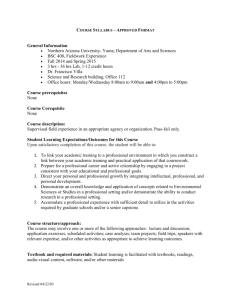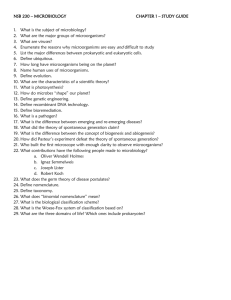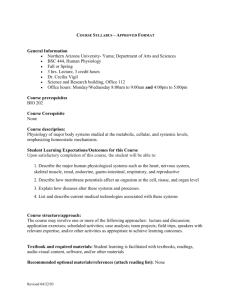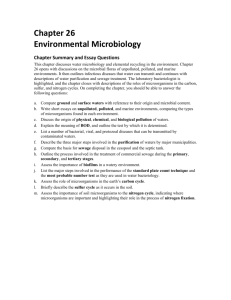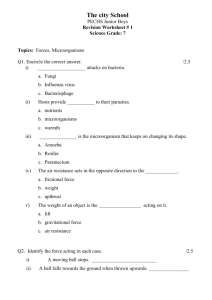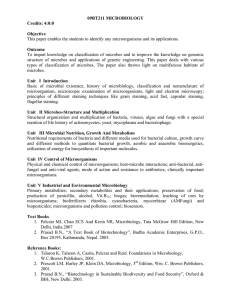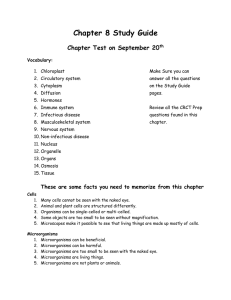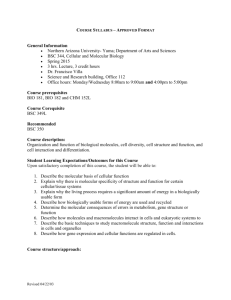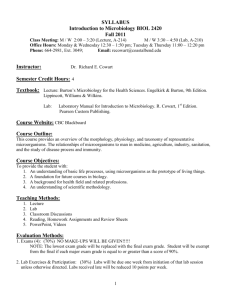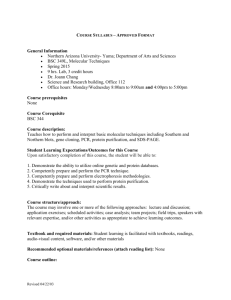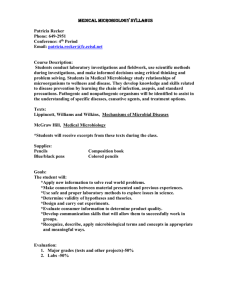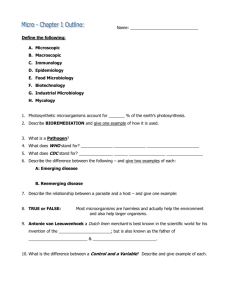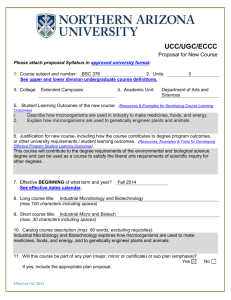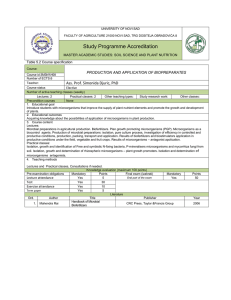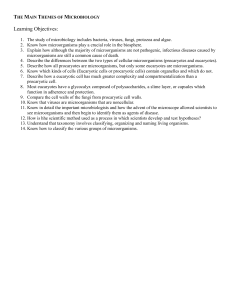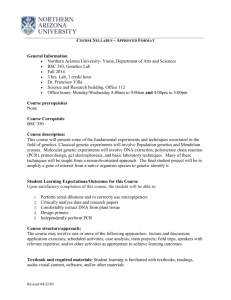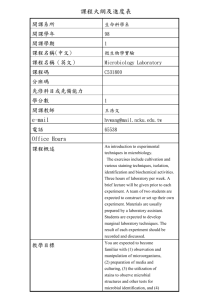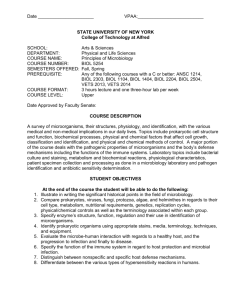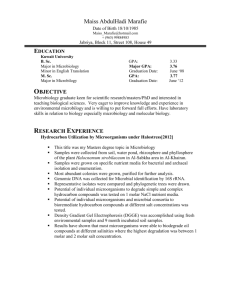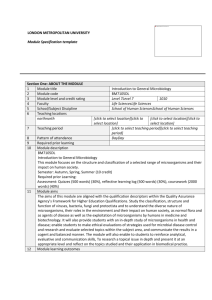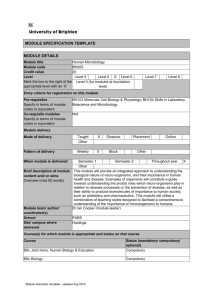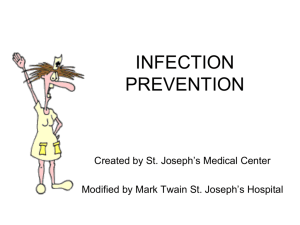BSC 376 Industrial micro and biotech Master Syllabus
advertisement
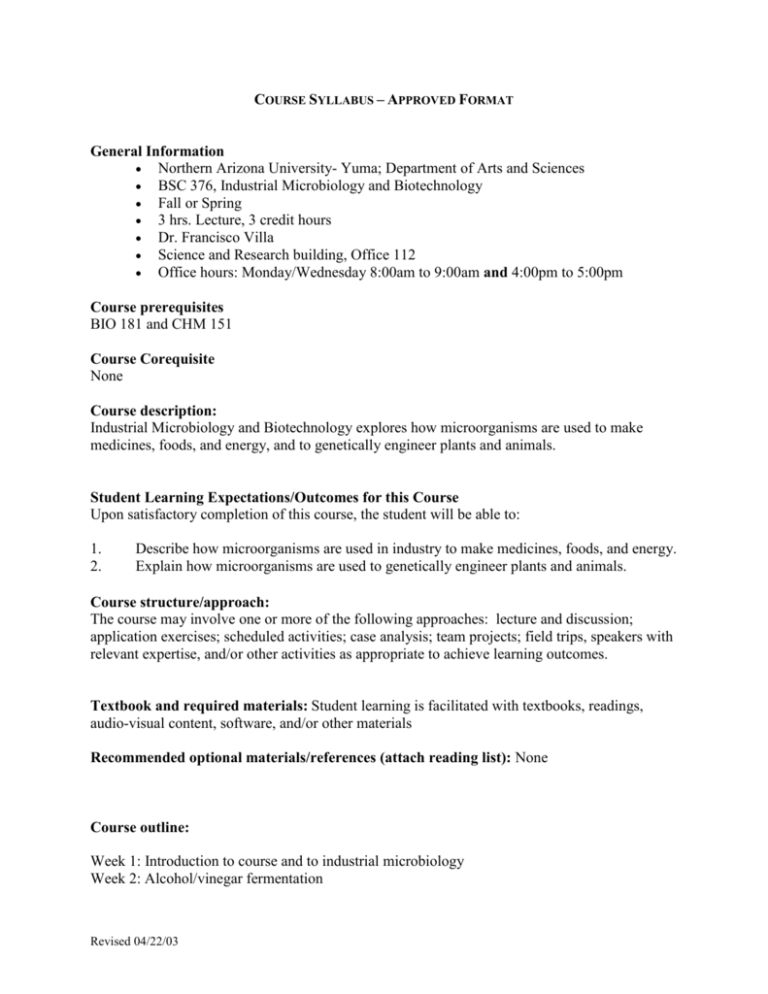
COURSE SYLLABUS – APPROVED FORMAT General Information Northern Arizona University- Yuma; Department of Arts and Sciences BSC 376, Industrial Microbiology and Biotechnology Fall or Spring 3 hrs. Lecture, 3 credit hours Dr. Francisco Villa Science and Research building, Office 112 Office hours: Monday/Wednesday 8:00am to 9:00am and 4:00pm to 5:00pm Course prerequisites BIO 181 and CHM 151 Course Corequisite None Course description: Industrial Microbiology and Biotechnology explores how microorganisms are used to make medicines, foods, and energy, and to genetically engineer plants and animals. Student Learning Expectations/Outcomes for this Course Upon satisfactory completion of this course, the student will be able to: 1. 2. Describe how microorganisms are used in industry to make medicines, foods, and energy. Explain how microorganisms are used to genetically engineer plants and animals. Course structure/approach: The course may involve one or more of the following approaches: lecture and discussion; application exercises; scheduled activities; case analysis; team projects; field trips, speakers with relevant expertise, and/or other activities as appropriate to achieve learning outcomes. Textbook and required materials: Student learning is facilitated with textbooks, readings, audio-visual content, software, and/or other materials Recommended optional materials/references (attach reading list): None Course outline: Week 1: Introduction to course and to industrial microbiology Week 2: Alcohol/vinegar fermentation Revised 04/22/03 Week 3: Renewable energy Week 4: Health care products Week 5: Microbial enzymes Week 6: Culturing microorganisms Week 7: Microbial growth and nutrition Week 8: Downstream processing Week 9: History of biotechnology Week 10: genetic engineering Week 11: Using microorganisms to alter the genomes of plants Week 12: Using microorganisms to alter the genomes of animals Week 13: Cloning mammalian cells Week 14: Sunthetic Life Week 15: Synthetic Life Week 16: Bioethics Assessment of Student Learning Outcomes Methods of Assessment: In-class exams, homework, in-class activities, research paper, and/or presentations. Timeline for Assessment: Over the course of the semester Grading System: Letter grades for the course will be determined based on the percentage of the total points as follows: 90-100% A Excellent 80-89% B Good 70-79% C Average 60-69% D Lowest passing <60% F Failure Course policy: Retests/makeup tests: No make-up exams or re-tests except for what the instructor may deem as extenuating circumstances. Attendance Policy: Under NAU Policy, students are expected to attend every session of the class in which they are enrolled. Statement on plagiarism and cheating: DON’T CHEAT! Please refer to the NAU Student Handbook policy statement on Academic Integrity. Academic honesty does not allow "plagiarism — knowingly representing the words or ideas of another as one's own" (2005, Undergraduate General Academic and Graduation Policies). Revised 04/22/03 If your instructor determines that you are guilty of plagiarism he deserves the right to give you a zero on the alleged assignment up to failing the course in question. All incidents regardless will be reported to the university. University policies Attach the Safe Working and Learning Environment, Students with Disabilities, Institutional Review Board, and Academic Integrity policies or reference them on the syllabus. See the following document for policy statements: http://www4.nau.edu/avpaa/UCCPolicy/plcystmt.html. Your instructor reserves the right to make any changes to the course policies, schedule, or any other aspect of the class as he sees fit. Revised 04/22/03
